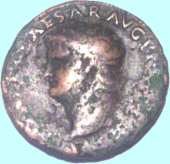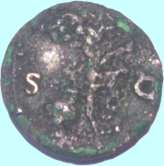|
Roma, 26.11.2005
Egregio
Lettore,
purtroppo lo
stato di usura, unitamente allo scarso dettaglio delle
immagini, impediscono di catalogare con certezza la
moneta. Infatti non è chiaro se:
- l'apice
inferiore del busto termini con una sferetta,
presente nelle monete neroniane emesse dalla zecca
di Lugdunum;
- la
leggenda del dritto sia: IMP NERO CAESAR AVG P MAX
TR P P P;
- Nerone
indossi o meno una corona.
Ipotizzando che
la sferetta sia presente, che la leggenda del dritto
fosse all'origine quella sopra indicata e che Nerone
sia a capo scoperto, la moneta potrebbe essere così
catalogata:
Asse1, zecca di Lugdunum, 66-67 d.C., RIC I
544, BMC
I 388, C I
303, indice di rarità
"C"
D. IMP NERO CAESAR AVG P M TR P P P 2. Nerone, testa scoperta a sinistra. Bordo
perlinato.
R. S C a sinistra e a destra
nel campo. Vittoria3 alata sorregge con le mani uno scudo
inscritto SPQR. Bordo perlinato.
Di seguito
riporto i link a monete "simili" a quella di figura
reperiti nel web:
- http://www.wildwinds.com/coins/ric/nero/RIC_0544.jpg
Current Starting bid US $1.00 bid US $51.25
Dec-09-02 1 ROMAN EMPIRE NERO Emperor AD 54-68 As
(9.7 grams, 28.95 mm) Obverse: IMP.NERO CAESAR
AUG.P.MAX.TR.P.P.P, His bare head left Reverse:
S.C, Victory flying left holding shield inscribed
SPQR [Image] Reference: Sear 690 v., Van Meter 32
v. Grade: Very Fine Scarce Choice high relief
portrait and all legible reverse with good relief
Well centered. Well struck. Green patina A very
light surface corrosion doesn't allow a good scan
of the coin As it is, a very nice coin in hand
with a nice high relief portrait Nero (AD37-68)
was born Nero Claudius Caesar Drusus Germanicus on
December 15 of the year 37 at Antium and
originally named Lucius Domitius Ahenobarbus, Nero
was the son of the consul Gnaeus Domitius
Ahenobarbus and Agrippina the Younger,
great-granddaughter of Emperor Augustus. In 49
Agrippina married her uncle, Emperor Claudius I,
and the following year she persuaded him to adopt
her son, whose name was then changed. Later,
Claudius married Nero to his daughter Octavia and
marked him out for succession, bypassing his own
son, Britannicus. On Claudius's death (54), the
Praetorian Guards, under their prefect Sextus
Afranius Burrus, Agrippina's agent, declared Nero
emperor at the age of 17. The initial five years
of Nero's reign, guided by Burrus and the
philosopher Seneca, Nero's tutor, were marked by
moderation and clemency, although Nero had his
rival Britannicus poisoned. In 59 he had his
mother put to death for her criticism of his
mistress, Poppaea Sabina. In 62 he divorced (and
later executed) Octavia and married Poppaea.
Burrus died, possibly poisoned, and Seneca
retired. In July 64, two-thirds of Rome burned
while Nero was at Antium. In ancient times he was
charged with being the incendiary. According to
some accounts, he laid the blame on the
Christians-few at that time-and persecuted them.
He sheltered the homeless, however, and rebuilt
the city with fire precautions. The building
programs, like the spectacles and free grain he
provided for the populace, were financed by
plundering Italy and the provinces. Viewing
himself as an artist and a religious visionary, he
scandalized the army and aristocracy when he
appeared publicly as an actor in religious dramas.
Meanwhile, the empire was in turmoil. Nero
established Armenia as a buffer state against
Parthia, but only after a costly, unsuccessful
war. Revolts broke out in Britain (60-61) and in
Judea (66-70). In 65 Gaius Calpurnius Piso led a
conspiracy against the emperor; 18 of the 41
prominent Romans implicated in the plot perished,
among them Seneca and his nephew, the epic poet
Lucan. Poppaea was kicked to death by Nero, and he
married Statilia Messalina after executing her
husband. In 68 the Gallic and Spanish legions,
along with the Praetorian Guards, rose against
him, and he fled Rome. Declared a public enemy by
the Senate, he committed suicide on June 9, 68,
near Rome. Encarta Encyclopedia 2000.
- http://www.wildwinds.com/coins/ric/nero/RIC_0544.5.jpg
May 07, 1999 - 08:00 PM PT (85 Lots) Lot: 29 Nero.
Ancient. AE As, 10.9 grams. (Sear690) 54-68 AD.
Grade:Fine Rx: S C, Victory flying left holding
shield inscribed SPQR. [L266256] Next Bid: $67.00
.
- http://www.wildwinds.com/coins/ric/nero/RIC_0544.3-o.jpg
http://www.wildwinds.com/coins/ric/nero/RIC_0544.3-r.jpg
Currently
$73.00 Oct-01-01 ORC2015 Nero, as, Victory &
shield VF Nero, Æ as, (8.46g) IMP NERO CAESAR AVG P
MAX TR P P P Bare head left. / No legend. Victory
left, bearing shield marked S P Q R. RIC 544. VF,
brown patina, flan flaws on legend.
- http://www.wildwinds.com/coins/ric/nero/RIC_0544.1.jpg
Currently $52.90 Jun-07-01 Roman Empire. Nero.
A.D. 54-68. AE Dupondius. 10.336 grams. Lugdunum
Mint c. A.D. 66. Obverse: IMP. NERO CAESAR AVG. P.
MAX. TR. P. P. P. Nero, bare-headed, l. Reverse: S
- C to l. and r. of Victory flying l., holding in
both hands shield. RIC 182, 544. WCN 596. BMC 387.
Very Fine/Fine+.
- http://www.classicalcoins.com/product150.html
R0690 2000 Nero: AE As $100.00 Obv. IMP NERO
CAESAR AVG P MAX TR P PP Laur. hd. l. Rev. S C
Victory flying l. hldg. shield Sear 690; RIC 544
sl. uneven, oth. nVF.
Concludo
osservando che le caratteristiche di stile della
moneta di figura sembrano a prima vista accettabili ma
andrebbero osservate più da vicino.
Un saluto
cordiale.
Giulio De
Florio
-------------------------------
Note:
(1) Traggo dai link sopra citati e da BMC
le caratteristiche fisiche di alcuni assi della
tipologia di figura battuti dalla zecca di Lugdunum
che raccolgo di seguito in tabella:
| Riferimenti |
Peso (g.) |
Asse di conio (ore) |
Diametro (mm) |
| link 1 |
09.70 |
- |
28,95 |
| link 2 |
10.90 |
- |
- |
| link 3 |
08.46 |
- |
- |
| link 4 |
10.34 |
- |
- |
| BMC 387 |
09.68 |
6 |
30,48 |
| BMC 388 |
09,95 |
6 |
30,48 |
Dalla tabella
si evince che l'asse di figura (10.37g, 25mm, 6)
presenta un peso comparabile con quello dei conî
d'epoca. L'asse di conio ad ore 6 era la norma per gli
assi di Nerone. Il diametro poteva scendere anche a
28mm.
(2) IMPerator NERO CAESAR AVGustus Pontifex
Maximus TRibunicia Potestas Pater Patriae.
(3) Secondo BMC, il tema della Vittoria è
probabilmente legato alla campagna contro i Parti. |

